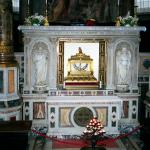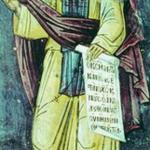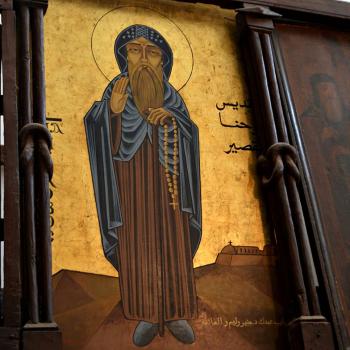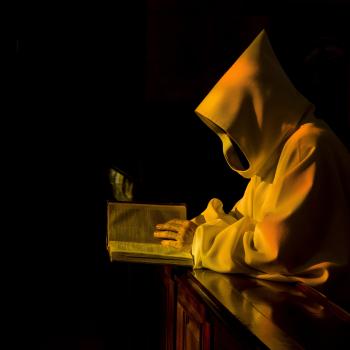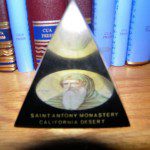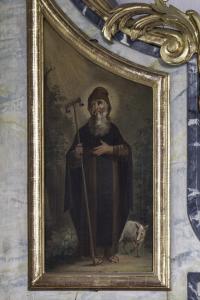
It would be easy to misrepresent St. Antony the Great, to portray him as a radical individualist looking to separate himself from all society so that he could attain holiness in blessed solitude. St. Antony, of course, did enjoy solitude. He went deeper and deeper into the Egyptian desert, in part, searching for such solitude. But, as is clear when one examines his life and various sayings attributed to him, he did not think this represented an ideal which all should imitate. He did not think holiness was found merely by separating oneself from society, indeed, by ignoring one’s place in society. This is why he could indicate that a doctor was just as holy as himself. Likewise, he accepted his role in training and helping those who followed after him into the desert: he did not abandon his responsibility, leaving it to others to direct them but instead made sure he gave them pastoral guidance based upon his own spiritual expertise.
The Christian life is not meant to be one of radical abandonment of others, but rather, it is meant to be lived for the sake of others. Antony, even when he isolated himself from others, was never completely separated from them. When he felt it was necessary, he overcome he isolation, as St. Athanasius indicated happened when Christians were being persecuted under Maximinus as well as when he felt the need to respond to Arius. While he wanted to join in with the martyrs and be executed with them, when he learned that was not likely, he accepted that he had been given a different role, one where he ministered to those who were imprisoned or those on their way to being executed, helping them any way he could:
After this the Church was seized by the persecution which then took place under Maximinus, and when the holy martyrs were led to Alexandria, Antony also followed, leaving his cell, and saying, Let us go too, that if called, we may contend or behold them that are contending. And he longed to suffer martyrdom, but not being willing to give himself up, he ministered to the confessors in the mines and in the prisons. And he was very zealous in the judgment hall to stir up to readiness those who were summoned when in their contest, while those who were being martyred he received and brought on their way until they were perfected. The judge, therefore, beholding the fearlessness of Antony and his companions, and their zeal in this matter, commanded that no monk should appear in the judgment hall, nor remain at all in the city. So all the rest thought it good to hide themselves that day, but Antony gave so little heed to the command that he washed his garment, and stood all next day on a raised place before them, and appeared in his best before the governor. Therefore when all the rest wondered at this, and the governor saw and passed by with his array, he stood fearlessly, showing the readiness of us Christians. For, as I said before, he prayed himself to be a martyr, wherefore he seemed as one grieved that he had not borne his witness. But the Lord was keeping him for our profit and that of others, that he should become a teacher to many of the discipline which he had learned from the Scriptures. For many only beholding his manner of life were eager to be imitators of his ways. So he again ministered as usual to the confessors, and as though he were their fellow captive he laboured in his ministry.[1]
Antony did not act alone; he had many monks with him, and they all labored with him in his ministry to the martyrs and confessors. He understood it was better for them do to this than to be on some spiritual retreat in the desert, engaging an ascetic discipline, because the point of such discipline was to make sure he and his fellow monks knew how to live and act rightfully before God. He knew that when he was given the chance to do some good for the community, he could not sit back and do nothing, for that would show all his discipline was in vain. He could easily have found some excuse to stay in the desert, but if he had done so, it would have shown how far his discipline was from the true ascetic ideal, for he would have stayed so as to enjoy the peace he found in the desert instead of taking that peace and using it to help him engage the needs of others. In other words, he understood monastic calling was not one which led to a separation of ascetics from society, but rather as a place where one should develop oneself so that they will then be able to do what they can for the good of all.
It is for this reason why Antony would not remain in silence when he heard of the discord brought into the church by Arius. In his letters, he said Arius had not gained a proper understanding of himself, and as such, did not understand God properly. Arius’ confusion brought further confusion into the church, and so it needed to be given a proper response by one who had developed a proper understanding of themselves (and through that self-knowledge, God). Thus, instead of keeping himself in isolation when he saw trouble in the church, instead of trying to separate himself from society as a way to keep himself pure, he journeyed to Alexandria and lent his support to those who confronted Arius’s claims:
And once also the Arians having lyingly asserted that Antony’s opinions were the same as theirs, he was displeased and angry against them. Then being summoned by the bishops and all the brethren, he descended from the mountain, and having entered Alexandria , he denounced the Arians, saying that their heresy was the last of all and a forerunner of Antichrist. And he taught the people that the Son of God was not a created being, neither had He come into being from non-existence, but that He was the Eternal Word and Wisdom of the Essence of the Father. And therefore it was impious to say, ‘there was a time when He was not,’ for the Word was always co-existent with the Father. Wherefore have no fellowship with the most impious Arians. For there is no communion between light and darkness. For you are good Christians, but they, when they say that the Son of the Father, the Word of God, is a created being, differ in nought from the heathen, since they worship that which is created, rather than God the creator. But believe that the Creation itself is angry with them because they number the Creator, the Lord of all, by whom all things came into being, with those things which were originated. [2]
While Antony was in the city, he did more than respond to Arius; he helped others deal with their own personal needs so that, as Athanasius indicated, all kinds of miracles were associated with his visit:
All the people, therefore, rejoiced when they heard the anti-Christian heresy anathematised by such a man. And all the people in the city ran together to see Antony; and the Greeks and those who are called their Priests, came into the church, saying, ‘We ask to see the man of God,’ for so they all called him. For in that place also the Lord cleansed many of demons, and healed those who were mad. And many Greeks asked that they might even but touch the old man, believing that they should be profited. Assuredly as many became Christians in those few days as one would have seen made in a year. Then when some thought that he was troubled by the crowds, and on this account turned them all away from him, he said, undisturbedly, that there were not more of them than of the demons with whom he wrestled in the mountain. [3]
Antony enjoyed solitude because it gave him the opportunity to wrestle against his own inner demons, to overcome all those elements in his life which hindered his proper relationship with God, and therefore, with the rest of humanity. He realized his discipline was not to be an ends, but only a means, and he knew that it was not a means meant for everyone. He understood the temptation to stay apart from others, but he knew if he gave into that temptation, he would have lost his fight against his own demons, having lost the point of his ascetic discipline. But he did not lose the point. He always saw the greater picture, and so he served as a spiritual leader, helping many who came to him, even as he understood that what he had gained could not and should not always be hidden away, which is why when he thought the time was right, he went into the world, spreading grace as he did so.
[1] St. Athanasius, “The Life of Antony” in NPNF2(4): 208-9.
[2] St. Athanasius, “The Life of Antony,” 214.
[3] St. Athanasius, “The Life of Antony,” 214-5.
Stay in touch! Like A Little Bit of Nothing on Facebook.
If you liked what you read, please consider sharing it with your friends and family!


